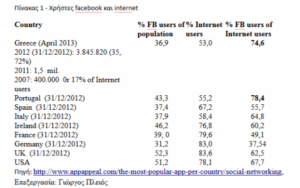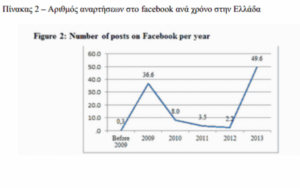 On the occasion of the Journalism Symposium that took place at the end of September, on the future of the production and consumption of mass media, the professor and chairman of the Department of Communication and Media of the University of Athens, George Plios, spoke to "K" about his recent research in the world of Facebook, but also his overall perspective towards the social media.
On the occasion of the Journalism Symposium that took place at the end of September, on the future of the production and consumption of mass media, the professor and chairman of the Department of Communication and Media of the University of Athens, George Plios, spoke to "K" about his recent research in the world of Facebook, but also his overall perspective towards the social media.
Mr. Plios, together with his colleagues at the Social Research Laboratory of the University of Athens, has followed through five surveys, since 2009, the coverage of the crisis in Europe and especially the economic crisis in Greece, in the media of Greece, Portugal, Italy, Germany, France and Great Britain. Based on the most recent one on social media, it gives us very interesting data on what exactly is being discussed on social media in Greece, but also what their role is ultimately.
After studying the traditional media and noting their adoption of the theory of the country's political and economic elites, he wanted to observe whether the same applies to the new media and especially to Facebook. In Greece, the percentage of users of this platform is much higher than for users of other social media. Specifically, 74%, as far as they are internet users also have an account on this social networking platform (Table 1).
 Through the research, Plios finds that the agenda of the new media is not very different from the old media agenda. It is characteristic that in new media, the attention of users is focused "mainly on what we call power". For this reason, it is described by the professor as a huge 'café', in which the themes of the old media are discussed and criticised.
Through the research, Plios finds that the agenda of the new media is not very different from the old media agenda. It is characteristic that in new media, the attention of users is focused "mainly on what we call power". For this reason, it is described by the professor as a huge 'café', in which the themes of the old media are discussed and criticised.
 According to Mr. Plios, the increase in the use of Facebook in our country and the simultaneous decrease in spending on entertainment coincided with the outbreak of the crisis (table 2). "It is a space where cultural consumption is moving from old media - the cinema, the theatre, the tavern, possibly - to the internet and social media. It's a way of making one's identity and a space where one continues to project or create and amplify a political presence that previously had no or much weaker presence," he notes.
According to Mr. Plios, the increase in the use of Facebook in our country and the simultaneous decrease in spending on entertainment coincided with the outbreak of the crisis (table 2). "It is a space where cultural consumption is moving from old media - the cinema, the theatre, the tavern, possibly - to the internet and social media. It's a way of making one's identity and a space where one continues to project or create and amplify a political presence that previously had no or much weaker presence," he notes.
However, he stresses that it is a false impression that some people may have that social media is an alternative. Many believe that they are means of political mobilisation, including Facebook. "That doesn't seem to be true. If you look at some specific political events, such as the Arab Spring or the Indignados movement in Greece, you really come to that conclusion." But this is nothing more, according to the professor, than "some discontinuities, isolated events in a large flow." Michael Geckel, Professor of Sociology at the University of Trier in Germany, who attended the Journalism Symposium in Athens as one of the keynote speakers, agrees on this point. "Social networks seem to be a fast medium for organizing political events, rallies, etc. In this sense it is a relatively powerful tool. But when it comes to organising interests in a broad sense, it seems rather like a slow tool," he points out.
However, Plios, speaking in more detail about the case of the Arab Spring, explains that social networks may be means of mobilization, but it is not correct to consider them as responsible for the "darkness" that followed the Arab Spring and was characterized by some scholars as the "Arab winter". "Social media is just the medium," says Pleios. "The effect came from the political process." In this way he subscribes, in this particular case, to the theory of the "instrumental" neutrality of social media.
Moreover, and through his research on Facebook in our country, he observed that it is not used as a means of confrontation or opposition, but as a solution to adapt to the difficult environment of the crisis. Its users are looking "to find a new way of being" in the crisis, so it is a way of learning to live differently, transferring economic activities to the digital environment and creating potential communities.
Democracy and social media freedom
According to the Center for Digital Journalism (Tow Center) at Columbia's School of Journalism, the people who were known as the public are no longer readers and viewers, but publishers of the news with a simple "click." Mr. Yeckel, referring to social media, makes the case for more communication, not more democracy. It reinforces the "sense that everyone can be heard". "The central problem of any platform is to consolidate this engagement," he stresses. He confirms, however, that through the use of social media the ability of the recipient of the information to respond is enhanced. However, according to Geckel, the public will continue to play a passive role and not respond to the possibility of communicative interaction.
For Plios, social media enrich, expand and analyse the limits of democracy, "pushing it, if you like, into more direct forms". Through them, it is possible to express concerns, opinions and ideas from people who have not been able to raise them in public debate.
On the occasion of Jacqueline de Romilly's statement on freedom in the Athenian Republic, a reflection emerges through a parallelism. The need for freedom in the modern world has reached "frantic individualism, to the point where one ends up not caring about the collective". The freedom that is claimed and exists on the internet is freedom of expression. This freedom, of course, should not be restricted for any reason, according to Pleyot, but also according to UNESCO reports. However, combined with the personalised nature of social media, there is a risk that it could also lead to personalised goals that are far from helping collective well-being.
According to Yekel, any organisations that have emerged from social media, such as the Five Star Movement in Italy, often "lack a common and stable ground that would strengthen the rallying and lead to compromise solutions to enable them to stand the test of time". Ultimately, they may not even be able to acquire a common goal. Plios does not rule out the emergence of similar political formations at the international level. However, he expresses doubts about whether the conservative political scene in our country will be able to highlight and support such movements. The main issue for the professor is "how to adapt the existing model of democracy to the model of communication that has already been formed".
Populist voices of social media
Mr. Plios cannot understand why some people talk about populist voices on social media. Political discourse is inherent to democracy and effectively has propaganda and populist content since it is aimed at a heterogeneous audience, he says. Therefore, propaganda content is not an exclusive feature of social media. There are, however, new media that, because of their form and potential, more easily promote such messages. For example, Twitter, which with its limited space for expression (140 characters) does not promote the development of ideas, but rather provides information, instructions and references, according to the professor.
The talk of journalism
"The internet is the Wild West of mass communication today and an unsafe space for worthy creators", Plios stresses. Google's executive chairman, Eric Schmidt, in a recent interview with K, stressed that the real change is occurring in the way people behave. Today's technology allows for a computer to be in everyone's hands. This power and citizen participation in the news should, according to the Tow Center, lead not only to a change in tactics, but also a change in the perception of their role on the part of professionals in the field. According to Pleiot, the reintroduction of journalism - with the subjective perception of the journalist evident - promotes a healthy dialogue with fruitful ideological and scientific debates.
In Greece, the use of social media is a huge power in the hands of people who seem to use it to adapt to the difficult reality of the crisis. The bet they have to win is to develop democracy and prosperity in this "Wild West".
Source: portal.kathimerini.gr
